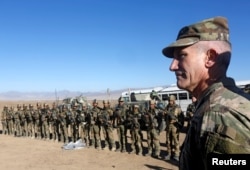U.S. and NATO-led coalition officials are pushing back on a report that U.S. President Donald Trump has instructed "top diplomats" to pursue "direct talks" with the Taliban in an effort to "jump-start" negotiations with the militant group in the hope of bringing an end to the 17-year war in Afghanistan.
The New York Times said Sunday the move represents a "significant shift in American policy in Afghanistan."
The move has been confirmed by "several senior American and Afghan officials," according to the newspaper.
Monday, the NATO-led coalition in Afghanistan issued a statement refuting "reports by the media that the Resolute Support commander said the U.S. is ready to join direct negotiations with the Taliban during a visit with Afghan provincial and government representatives in Kandahar, July 16."
U.S. Gen. John Nicholson, commander of international forces in Afghanistan, said: "The United States is not a substitute for the Afghan people or the Afghan government. My reaffirmation of Secretary [Mike] Pompeo's statement in which he said peace talks would include a discussion of international forces and that the United States is ready to work with the Taliban, the Afghan government and the Afghan people toward lasting peace was mischaracterized."
A State Department spokesperson added Monday, "The United States is exploring all avenues to advance a peace process in close consultation with the Afghan government. Any negotiations over the political future of Afghanistan will be between the Taliban and Afghan government."
Senior U.S. officials have been in Afghanistan and Pakistan recently. The Times said they were "holding talks with major players" in both countries in preparation for direct talks.
The report said there is a growing "consensus" among American and Afghan officials that the only way to "fire up a peace process" and come to an agreement on an exit strategy for the war "is for the United States to take a more direct role in negotiations."
Still, military officials said Monday, the peace process remains Afghan-led.
"The U.S. is exploring all avenues to advance a peace process in close consultation with the Afghan government," said U.S. Army Lt. Col. Martin L. O'Donnell, Resolute Support spokesman. "But this remains an Afghan-led process."
The Taliban has often insisted it will only talk with the United States and its NATO allies about ending the fighting, calling the Afghan government a puppet of the West.
The Times said no date has been set for the talks and peace efforts could still be derailed, but the shift in U.S. strategy exposes the "sense of urgency" the Trump administration feels "to break the stalemate in Afghanistan."
VOA's Nike Ching contributed to this report.






